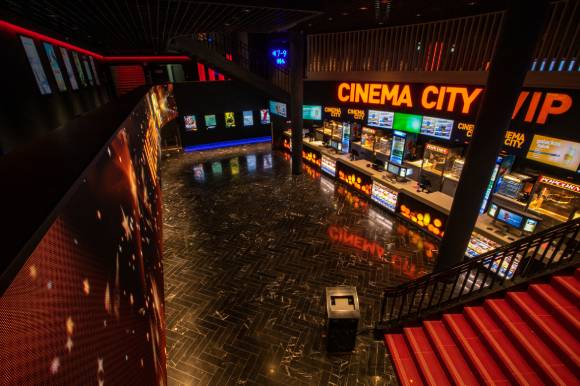 Hungarian cinemas were closed for the most part of the pandemic. What has Cinema City done to minimise its losses over the course of these months?
Hungarian cinemas were closed for the most part of the pandemic. What has Cinema City done to minimise its losses over the course of these months?
Andrea Buda: We were partly able to save on salaries. We had colleagues who did not receive their full salary during this period, and we could not employ colleagues hired through the student employment agency. Our operating costs also decreased as all our equipment – projectors, servers, as well as theatres - was switched off, so we consumed much less electricity, for example. Our supplier partners took back some of the products delivered to the cafeterias, and in case they weren’t able to, we donated them to charity. All other planned expenditures, such as those for renovation, were frozen for the duration of the closure. We used to renovate one or two cinemas a year before 2019, but we’ve stopped that for now.
Will you be renovating in 2021 or are you still careful?
Andrea Buda: We are still waiting to see how things develop. We reopened on 3 June 2021, so we have only been able to operate in the second half of this year. As a result, we are currently cautious with all our spendings. When it’s necessary, we do maintenance, but we are not making large investments yet.
We had opened the Mammut cinema in Budapest last October, which we had to close in November after the Covid measures were tightened. This was the last major investment (of more than 2 million EUR) which we made in the shadow of the coronavirus pandemic. We trusted the Hungarian cinema market so much that we completed this investment.
Did the government provide support to Cinema City during the pandemic?
Andrea Buda: It was not given specifically to Cinema City, but the National Film Institute - Hungary uniformly supported all cinemas that are members of the National Association of Cinemas. As part of the support, “Hungarian Film Month” was organised in the summer of 2020, during which we focused on and screened Hungarian feature films. With the support of the Ministry of Human Capacities, the National Association of Cinema's 2021 campaign to promote Hungarian cinemas was implemented with the slogan: “Hungarian cinemas are expecting you back”. The joint campaign was completed by the middle of July. All cinema operators acted in unison for the first time – this opportunity brought us together. The campaign was about why it’s good to watch films in the cinema. None of the cinemas were recognisable in the campaign, except Puskin, because it has recently been voted as one of the most beautiful cinemas in the world.
Cinema City is a multinational company. Were the cinema chains of East-Central Europe affected to the same extent by Covid? Or is the situation in Hungary different from that of neighbouring countries?
Andrea Buda: It affected all countries just as badly. The situation was only different in that much more government grants could be applied for in some countries.
Hungarian cinemas could be reopened at the beginning of May 2021, but you waited until the beginning of June before reopening. Why?
Andrea Buda: It should be noted that it is much more expensive to reopen a large cinema chain than a small cinema. We also waited with reopening because the rules in force at that time limited our potential audience. It was only possible to visit cinemas with an immunity certificate, and those under the age of 18 could only come accompanied by an adult with an immunity certificate. The 12-18 age group is especially important for multiplex cinemas, and this target audience typically does not want to go to the cinema in the company of an adult. We opened up when the rules started to loosen. In early July, the rule enforcing proof of vaccination in order to visit cinemas was abolished.
How much capacity have the cinemas operated at since the reopening, compared to the pre-Covid period?
Andrea Buda: After reopening in 2020, the problem was that the USA was still closed at the time, so no large or mid-range films were released. The premieres of event films were postponed; they were waiting to be shown in the USA. When we reopened this summer, there was no longer a problem with the selection, because the US market had been open since April. The abolition of the obligation to present an immunity certificate brought a significant increase in July, with ticket sales up 30% the following week.
Today, there are already several days of the week - this is not yet true for all the days - when the number of tickets sold reaches pre-pandemic levels. This is due to the event films of the fall, for example Dune, Venom: Let There Be Carnage and No Time to Die. In several neighbouring countries, such as Romania, the pandemic situation is getting worse, ticket sales have started to decrease again, but this is not yet noticeable in Hungary.
 What safety regulations are currently in effect at Cinema City?
What safety regulations are currently in effect at Cinema City?
Andrea Buda: There are currently no restrictions in effect. The audience can use our facilities the same way as before COVID-19, that is without masks and without the necessity of presenting an immunity certificate. We also don’t need to leave chairs empty between the audience members - there used to be such a rule, but this is no longer in place. This is an exceptional situation in the region, for there are stricter Covid regulations for cinemas in most neighbouring countries. We’re still careful though: disinfectant is still available for the audience and we clean our facilities regularly.
Do you look to the future with confidence?
Andrea Buda: We are seeing an increasing proportion of people coming back to the cinema. But if restrictions - such as enforcing the wearing of masks and introducing immunity certificates - are mandatory again, it will negatively affect the number of cinema admissions.
What lessons has Cinema City learned from the pandemic?
Andrea Buda: I think every cinema has realised that reserves are very important and they will be very careful towards spending money in the future.



















